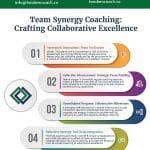TL;DR; Both remote and in-person coaching can be highly effective for ADHD executives, but the optimal choice depends on your specific sensory needs, attention patterns, and environmental preferences. Remote coaching offers flexibility and comfort for many ADHD brains, while in-person coaching provides deeper connection and fewer distractions for others. The key is matching the format to your individual ADHD profile and coaching goals.
Three years ago, I was convinced that effective coaching required being in the same room. As someone who values authentic connection and believes deeply in the power of presence, I thought virtual coaching would feel hollow, transactional, like trying to build a relationship through a keyhole.
Then the pandemic forced my hand, and I discovered something surprising. One of my most transformation-resistant clients – an executive who had been politely going through the motions in our face-to-face sessions for months – suddenly came alive on our video calls. From her home office, surrounded by her carefully curated environment, she began opening up about challenges she’d never mentioned before. The formality of our conference room sessions had been creating a barrier I hadn’t recognized.
But here’s what really changed my perspective: it wasn’t that remote coaching was universally better. Another client, who had been making steady progress virtually, asked to return to in-person sessions as soon as it was safe. For him, the physical separation created too much distance, and he needed the grounding presence of shared space to do his deepest work.
This experience taught me that the question isn’t whether remote or in-person coaching is superior – it’s about understanding how your unique ADHD brain responds to different environmental and interaction patterns, then choosing the format that unlocks your best thinking and growth.
Understanding ADHD-Specific Format Considerations
The choice between remote and in-person coaching becomes more complex when ADHD is involved because neurodivergent brains have specific needs that traditional coaching format discussions often overlook. Research on ADHD coaching effectiveness shows that coaching can be delivered successfully through various modalities, but the environmental and sensory factors matter more for ADHD brains than neurotypical ones.
ADHD executives often have heightened sensitivity to environmental stimuli, making the physical context of coaching sessions crucial for optimal engagement. Some thrive in the controlled environment of a professional office space, while others find such settings overstimulating or artificial. Understanding these patterns helps explain why the same executive might have vastly different coaching experiences depending on the format chosen.
The attention regulation differences inherent in ADHD also influence format effectiveness. Some ADHD brains focus better when they can move around, fidget, or control their immediate environment – all easier to manage during remote sessions. Others need the accountability and presence of in-person interaction to maintain engagement and avoid the pull of digital distractions that remote environments can introduce.
Virtual coaching research indicates that remote coaching can be particularly beneficial for individuals with neurodevelopmental differences like ADHD, offering flexibility and accessibility that traditional in-person approaches might not provide. However, this doesn’t mean remote is universally better – it means ADHD executives need more nuanced considerations when choosing their optimal format.
Remote Coaching: The ADHD Advantages
Remote coaching offers several specific advantages that align well with many ADHD brain patterns and executive lifestyle demands. Understanding these benefits helps you assess whether virtual coaching might be the right fit for your particular combination of ADHD traits and professional responsibilities.
Environmental Control and Sensory Management
One of the most significant advantages of remote coaching for ADHD executives is complete control over your sensory environment. You can adjust lighting, temperature, background noise, and seating arrangements to match your optimal focus conditions. Many ADHD brains are sensitive to fluorescent lights, uncomfortable chairs, or distracting sounds that are common in office environments but impossible to control.
During remote sessions, you can use the technology tools that support your ADHD brain without feeling self-conscious. Fidget tools, standing desks, essential oils, or background music that helps you focus become natural parts of your coaching environment rather than special accommodations you need to request.
I’ve worked with executives who conduct their most productive remote coaching sessions while walking on treadmill desks, sitting on exercise balls, or in naturally lit spaces that would be impossible to replicate in traditional coaching offices. This environmental optimization often leads to better attention regulation and more authentic engagement with the coaching process.
Flexibility and Executive Function Support
Remote coaching eliminates many of the executive function challenges that can interfere with consistent coaching engagement. No need to factor in travel time, parking, or navigation – all tasks that can consume significant cognitive energy for ADHD brains. The reduced logistical complexity means more mental bandwidth available for the actual coaching work.
The scheduling flexibility of remote coaching particularly benefits ADHD executives who struggle with rigid time structures or whose energy and attention patterns don’t align with traditional business hours. Sessions can be scheduled for your peak attention times, whether that’s early morning, late evening, or during lunch breaks when your office is quieter.
This flexibility becomes especially valuable when integrating coaching insights with work-life balance strategies for ADHD leaders. Remote sessions can happen from home, allowing for immediate application of organizational strategies or environment modifications discussed during coaching.
Reduced Social Performance Pressure
Many ADHD executives experience what I call “masking fatigue” – the exhaustion that comes from constantly monitoring and adjusting your behavior to appear neurotypical in professional settings. Remote coaching can reduce this pressure, allowing for more authentic self-expression and honest exploration of ADHD-related challenges.
The slightly increased psychological distance of remote communication can actually enhance intimacy and disclosure for some ADHD brains. Research on virtual coaching effectiveness suggests that some individuals find it easier to discuss sensitive topics when there’s a screen between them and their coach, particularly when addressing topics like disclosure decisions in the workplace or navigating workplace misconceptions about ADHD.
Technology Integration and Documentation
Remote coaching naturally facilitates better integration with the digital tools that many ADHD executives rely on for organization and follow-through. Screen sharing allows real-time collaboration on organizational systems, calendar optimization, or productivity tool configuration. Session recordings provide exact capture of insights and action items, addressing the working memory challenges that can make traditional note-taking difficult during coaching conversations.
The ability to easily reference previous session notes, action items, or progress tracking data during remote sessions supports the systematic measurement approaches that help ADHD executives see patterns and maintain motivation over time.
In-Person Coaching: When Physical Presence Makes the Difference
While remote coaching offers compelling advantages for many ADHD executives, in-person coaching provides unique benefits that some neurodivergent leaders find essential for their optimal development and growth.
Enhanced Accountability and Presence
For ADHD executives who struggle with digital distractions or find it difficult to maintain focus during screen-based interactions, in-person coaching provides a level of accountability and presence that’s harder to replicate virtually. The physical act of going to a coaching session creates a stronger psychological boundary between coaching work and other responsibilities.
The embodied presence of in-person coaching can be particularly valuable for executives working on emotional regulation and leadership presence. Body language, energy, and non-verbal communication provide additional information that helps both coach and client understand patterns and reactions that might not be apparent in virtual settings.
Some ADHD brains find that the slight formality and ritual of in-person meetings helps them transition into a focused, reflective mindset that’s harder to access when coaching from familiar environments filled with competing demands and distractions.
Deeper Relational Connection
While remote coaching can facilitate disclosure and reduce performance pressure, in-person coaching often enables deeper relational connection that some ADHD executives find essential for trust-building and sustained engagement. The full sensory experience of being in the same space – reading energy, picking up on subtle shifts in posture or breathing, experiencing the felt sense of another person’s presence – can create intimacy and understanding that supports breakthrough moments.
For executives working on complex leadership challenges or developing neurodiversity-informed leadership approaches, the richness of in-person interaction often provides more nuanced feedback and support for developing sophisticated interpersonal skills.
Reduced Technical Cognitive Load
Although ADHD executives are often comfortable with technology, virtual coaching still requires cognitive resources for managing audio quality, video connections, screen sharing, and other technical elements. For some ADHD brains, these technical demands create just enough additional cognitive load to interfere with deep engagement in the coaching conversation.
In-person coaching eliminates these technical considerations, allowing complete focus on the coaching work itself. This can be particularly valuable for executives who are already managing significant technology demands in their professional roles and prefer coaching to be a break from digital interfaces.
Environmental Boundaries and Context Shifting
While remote coaching offers environmental control, it can also blur the boundaries between coaching work and other life domains in ways that some ADHD executives find counterproductive. Going to a dedicated coaching space creates clear psychological separation between coaching conversations and the environments where daily challenges and stressors occur.
This boundary creation can be particularly important for executives working on strategic leadership development or addressing complex organizational challenges. The neutral, professional environment of in-person coaching provides space for perspective-taking and strategic thinking that might be harder to access in familiar surroundings.
Hybrid Approaches: Getting the Best of Both Formats
Rather than viewing remote and in-person coaching as mutually exclusive options, many ADHD executives benefit from hybrid approaches that leverage the advantages of both formats strategically. This flexibility aligns with the variable nature of ADHD symptoms and energy patterns while accommodating the changing demands of executive responsibilities.
Phase-Based Format Selection
Different phases of coaching work may benefit from different formats. Initial relationship building and assessment might happen more effectively in person, where the full range of non-verbal communication supports rapid rapport development and comprehensive understanding of challenges and strengths.
Once the coaching relationship is established, regular sessions might shift to remote format for convenience and consistency, with periodic in-person sessions scheduled for intensive work, major transitions, or when addressing particularly complex challenges that benefit from the enhanced presence and connection of face-to-face interaction.
Goal-Driven Format Decisions
The nature of specific coaching goals can inform optimal format selection. Work focused on organizational systems development or productivity strategy implementation often benefits from remote sessions where screen sharing and real-time system building can happen naturally.
Conversely, coaching focused on leadership presence, interpersonal skills, or complex emotional regulation might benefit from in-person sessions where body language, energy, and full presence provide richer feedback and support for developing sophisticated interpersonal capabilities.
Energy and Attention Pattern Matching
Understanding your personal ADHD patterns helps inform format decisions on a session-by-session basis. During high-stress periods when travel and additional logistics feel overwhelming, remote coaching maintains continuity without adding burden. During periods when focus and motivation are challenging, the accountability and structure of in-person sessions might provide necessary support.
This flexible approach requires coaches who understand ADHD patterns and can adapt their approach based on client needs rather than rigid format preferences. Understanding how ADHD coaching differs from traditional approaches includes recognizing that format flexibility is often essential for optimal outcomes.
Technology Considerations for Remote ADHD Coaching
When choosing remote coaching, ADHD executives need to consider technology requirements that go beyond basic video conferencing. The right technology setup can make the difference between sessions that feel effortless and engaging versus those that create additional stress and distraction.
Essential Technology Infrastructure
Reliable internet connection becomes non-negotiable for remote coaching effectiveness. Poor audio or video quality creates cognitive load and frustration that interferes with coaching engagement, particularly for ADHD brains that may be more sensitive to technical disruptions. Investment in quality headphones or headsets often improves both audio clarity and focus by reducing background distractions.
Multiple device options provide backup and flexibility. Having both computer and phone available ensures continuity if one platform experiences technical difficulties. Some ADHD executives find certain devices more comfortable for different types of conversations – phones for reflective discussions, computers for collaborative work involving screen sharing.
ADHD-Friendly Platform Features
Different video platforms offer features that can support or hinder ADHD engagement. Recording capabilities help address working memory challenges by ensuring important insights and action items are captured accurately. Chat functions allow for real-time note-taking and link sharing without interrupting conversation flow.
Background noise suppression and visual background options help manage environmental distractions and self-consciousness that might interfere with authentic engagement. The ability to hide self-view can reduce self-monitoring and increase focus on the conversation itself.
Screen sharing capabilities become essential when working on organizational systems, reviewing productivity data, or collaborating on strategic planning documents. The ability to easily transition between face-to-face conversation and shared work enhances the practical value of coaching sessions.
Managing Digital Distractions
Remote coaching requires strategies for managing the digital distractions that ADHD brains often find irresistible when computer access is readily available. This might include closing non-essential applications, using website blockers during coaching sessions, or positioning devices to minimize the visual pull of notifications.
Some ADHD executives benefit from having a dedicated device or user account specifically for coaching sessions, eliminating work email notifications and other professional distractions that might pull attention away from coaching conversations.
Creating physical boundaries around remote coaching space – even within a home or office environment – helps signal to the brain that this time is protected for focused reflection and development work.
Organizational Considerations and Support
Organizations investing in ADHD executive coaching need to consider how format decisions impact both individual effectiveness and broader program success. Supporting format flexibility often requires adjusting policies, expectations, and measurement approaches to accommodate the diverse needs of neurodivergent leaders.
Cost and Resource Implications
Remote coaching typically offers cost advantages through reduced travel expenses, venue costs, and time investments. These savings can enable more frequent sessions or longer coaching engagements, both of which often benefit ADHD development patterns that may require more time and repetition than neurotypical coaching.
However, organizations should also consider the technology infrastructure and support needed to enable effective remote coaching. Providing high-quality video conferencing access, ensuring reliable internet connections, and supporting necessary privacy measures for confidential coaching conversations all require resource investment.
Privacy and Confidentiality Considerations
Legal rights and accommodation discussions often arise in ADHD executive coaching, making privacy and confidentiality particularly important considerations. Remote coaching may offer enhanced privacy for executives who prefer not to be seen entering coaching offices or who need to discuss sensitive workplace accommodation needs.
Organizations should ensure that remote coaching platforms meet appropriate security and confidentiality standards while providing adequate technical support to prevent privacy breaches that could undermine coaching effectiveness or create legal complications.
Integration with Broader Development Programs
Format decisions should align with other organizational development initiatives and support systems. If an organization provides extensive remote learning and development opportunities, adding remote coaching maintains consistency and leverages existing technology investments and employee comfort levels.
Conversely, organizations that emphasize in-person culture and connection might find that in-person coaching better aligns with broader values and development approaches, particularly when coaching is part of comprehensive leadership development programs that include multiple in-person components.
Making Your Format Decision: A Practical Framework
Choosing between remote and in-person coaching requires honest assessment of your individual ADHD patterns, professional circumstances, and coaching goals. This decision framework helps you systematically evaluate which format is most likely to support your optimal development and growth.
Coaching Format Self-Assessment
Environmental and Sensory Preferences Consider where you do your best thinking and feel most comfortable having important conversations. Do you prefer familiar, controlled environments where you can manage lighting, sound, and comfort factors? Or do you find that neutral, professional spaces help you separate coaching work from other life domains and focus more effectively?
Think about your sensory sensitivities and how they might impact different format options. Are you sensitive to fluorescent lighting, uncomfortable chairs, or background noise that might be present in coaching offices? Or do you find that the lack of environmental control in virtual settings – dealing with home distractions, family interruptions, or less-than-ideal audio quality – creates more stress than benefit?
Attention and Focus Patterns Reflect on when and how you maintain attention most effectively. Do you focus better when you can move around, use fidget tools, or adjust your physical position frequently? These needs are often easier to accommodate during remote sessions. Or do you find that the slight formality and accountability of in-person meetings helps you maintain engagement and avoid distractions?
Consider your relationship with technology and digital environments. For some ADHD executives, computer-based interactions feel natural and comfortable. For others, screen-based conversations create cognitive fatigue or make it harder to maintain sustained attention.
Professional and Logistical Factors Evaluate your schedule flexibility and travel patterns. If your calendar is packed with back-to-back commitments, remote coaching might provide necessary flexibility for consistent engagement. If you travel frequently or work irregular hours, virtual sessions might be the only practical option for regular coaching contact.
Consider your workspace privacy and environmental control. Do you have a quiet, private space for remote coaching sessions, or would office interruptions and home distractions interfere with coaching effectiveness? Some executives find that leaving their regular environment is necessary to shift into reflective, development-focused mindset.
Coaching Goals and Development Needs
Different coaching focuses may benefit from different format approaches. If you’re working primarily on systems, organization, and productivity strategies, remote coaching often provides practical advantages for real-time collaboration and implementation. If you’re focusing on leadership presence, interpersonal skills, or complex emotional regulation, in-person coaching might offer richer feedback and support.
Consider whether your coaching goals include developing strategies for workplace disclosure or navigating complex organizational dynamics. These sensitive topics might benefit from the enhanced privacy of remote sessions or the deeper connection possible in in-person meetings, depending on your personal comfort and communication patterns.
The Future of Flexible ADHD Coaching
The evolution of coaching delivery formats reflects broader changes in how we understand neurodiversity, technology, and professional development. For ADHD executives, this evolution creates opportunities for more personalized, effective coaching experiences that honor individual differences rather than forcing conformity to standard approaches.
Technology Enhancement and Innovation
Emerging technologies continue to expand possibilities for remote coaching effectiveness. Virtual reality applications, AI-powered session analysis, and advanced collaboration platforms may soon provide remote coaching experiences that capture more of the nuanced information currently available only through in-person interaction.
However, technology enhancement shouldn’t overshadow the fundamental importance of matching format to individual neurodivergent needs. The most sophisticated virtual platform won’t be effective for an ADHD executive who thrives on in-person connection, just as the most elegant coaching office won’t serve someone who needs environmental control and flexibility.
Organizational Understanding and Support
As organizational awareness of neurodiversity increases, companies are becoming more sophisticated about supporting diverse coaching needs. This includes recognizing that format flexibility isn’t just a nice-to-have accommodation but often a critical success factor for neurodivergent executive development.
Understanding the complete scope of ADHD coaching benefits includes recognizing that delivery format can significantly impact outcomes. Organizations that provide format choice and flexibility often see better coaching engagement and results from their neurodivergent leaders.
Individual Agency and Self-Advocacy
Perhaps most importantly, the expansion of format options empowers ADHD executives to advocate for coaching approaches that truly serve their development needs. Rather than adapting to whatever format a coach or organization prefers, executives can seek out coaching partnerships that offer the flexibility to optimize format for their unique combination of strengths, challenges, and goals.
This self-advocacy capability connects to broader themes of building leadership confidence and developing authentic leadership approaches that leverage rather than hide neurodivergent traits.
The question of remote versus in-person coaching for ADHD executives ultimately comes down to understanding your individual patterns, preferences, and goals, then finding coaching partners who can adapt their approach to support your optimal development. The best coaching format is the one that enables you to show up authentically, engage deeply, and implement insights effectively in your leadership role.
Whether you thrive in the environmental control and flexibility of remote coaching, the presence and accountability of in-person sessions, or a hybrid approach that leverages the benefits of both, the key is choosing consciously based on your actual experience rather than assumptions about what should work.
The future of ADHD executive coaching lies not in determining the “best” format universally, but in developing increasingly sophisticated approaches to matching delivery methods to individual neurodivergent needs. Understanding your complete coaching options includes recognizing that format flexibility often makes the difference between coaching that feels effortful and coaching that feels transformational.
Frequently Asked Questions
Can I switch between remote and in-person coaching during my engagement?
Absolutely! Many ADHD executives benefit from format flexibility throughout their coaching journey. You might start with in-person sessions for relationship building, then move to remote sessions for convenience, or alternate based on specific goals and life circumstances. The best coaches understand that ADHD patterns can be variable and will work with you to find the optimal format for each phase of your development. This flexibility should be discussed during initial coaching conversations.
What technology setup do I need for effective remote ADHD coaching?
Essential requirements include reliable high-speed internet, a device with good camera and microphone quality, and a quiet, private space for sessions. Invest in quality headphones to reduce distractions and improve audio clarity. Ensure your platform supports features like recording (for session notes), screen sharing (for collaborative work), and reliable video quality. Have backup options available (phone, different devices) in case of technical issues. Consider using website blockers or notification management to minimize digital distractions during sessions.
How does remote coaching handle the distractions that ADHD executives face at home?
Remote coaching can actually provide better distraction management for many ADHD executives because you control the environment completely. You can optimize lighting, temperature, seating, and background noise for your focus needs. However, it requires intentional preparation: closing unnecessary applications, managing notifications, creating physical boundaries around your coaching space, and potentially using apps or tools to block distracting websites. Many ADHD executives find that the environmental control outweighs the potential for home-based distractions.
Which format is more cost-effective for ADHD executive coaching?
Remote coaching typically offers cost advantages by eliminating travel time and expenses, parking fees, and other logistics-related costs. This often allows for more frequent sessions or longer coaching engagements within the same budget. However, consider the total value equation: if in-person coaching provides significantly better outcomes for your particular ADHD patterns and goals, the higher cost per session might still represent better overall value. The most cost-effective format is the one that creates sustainable behavior change and lasting leadership improvement.
Ready to explore which coaching format works best for your ADHD leadership development? The choice between remote and in-person coaching is deeply personal and depends on your unique combination of ADHD traits, professional demands, and development goals. I invite you to schedule a discovery conversation where we can discuss your specific needs and preferences, and explore how to structure a coaching approach that optimizes your format choice for maximum effectiveness and sustainable growth.
Schedule your complimentary consultation with Tandem Coaching Partners to discover the coaching approach that aligns perfectly with your ADHD executive needs.



Boost Your Leadership Team Success!
Take your leadership team to the next level and achieve great results with our executive coaching.
Learn how our coaching and ASPIRE method can change things for you—get a free brochure to begin your journey.
About the Author
Cherie Silas, MCC
She has over 20 years of experience as a corporate leader and uses that background to partner with business executives and their leadership teams to identify and solve their most challenging people, process, and business problems in measurable ways.















